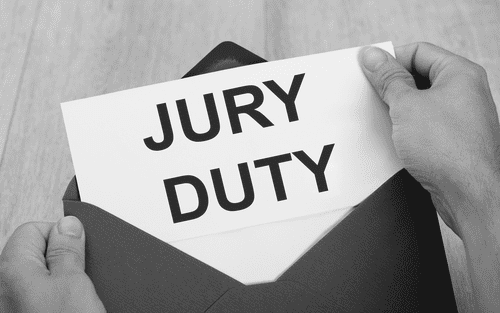Introduction
You have received a summons to appear for jury duty. You likely have questions and/or concerns about what happens next. These questions/concerns can involve your employment, your family, prior appointments, etc. These are all valid questions/concerns a potential juror may have.
Jury trials are an important part of our legal system. Jurors play a key role in the state’s justice system. The right to a trial by jury is one of the foundational stones of this country’s courts. For example, the Sixth Amendment guarantees the right to a jury trial to criminal defendants. The Seventh Amendment also provides individuals with the right to a jury trial in civil proceedings. However, not all civil cases are tried by a jury.
A jury trial is the most direct way for members of the community to take part in the justice system. Jury service helps to support fairness in trials, and is able to provide impartial viewpoints on the case presented.
The Jury Process
Most people are eligible to be chosen as jurors. However, there are certain exceptions which could make a person ineligible to serve on a jury. Potential jurors are selected at random from a pool and are generally instructed to call the court the evening before trial is set to commence. This is to ensure whether a juror needs to be present or if the case is settled.
If you end up having to go, all the potential jurors form a jury panel. From this panel, the lawyers, supervised by the judge, will select the jury by asking a series of questions. This process is known as voir dire. It is extremely important that you answer all questions asked truthfully.
In a criminal case, typically there are twelve (12) jurors chosen for felony trials and six (6) in misdemeanor trials. However, a defendant facing a serious misdemeanor offense may be able to request a twelve (12) person jury. In civil cases, there must be six (6) jurors but sometimes a jury can consist of nine (9) jurors.
You must contact the court when summoned. If you are in a serious hardship, jury duty can be postponed or you may be excused. A person with a disability, which affects the capacity to be a juror, may also be excused. If you are selected as a juror, your employer must give you the time off work. Your job is protected under Title 28, United States Code, Section 1875.
Usually, you will only be away for a day or two. It is possible; however, that you end up in a trial which lasts several weeks, or even months. You should be reimbursed for travel expenses for getting to court and will be paid a certain amount of money per day for your attendance. There is no dress code but try not to wear anything too flashy. The attention is supposed to be on the case and not you.
Your jury duty should be taken seriously. You will be making decisions, which greatly affect the lives of those involved. All parties involved have probably spent hours preparing for this trial and want to win. We understand that this has the ability to disrupt your daily routine and that many people sometimes resist the process as much as possible to not have to serve on the jury. However, think about it this way, serving on a jury is an honorable privilege awarded to us by our democracy. Attorneys and judges realize the inconvenience of jury duty and are extremely grateful to every person that sits on a jury.
Would you still like more information regarding Jury Duty? Check out the State of North Dakota Courts section regarding Jury Duty.
My hope for you is that the next time you get a jury summons in the mail, you will think more positively regarding the potential experience and maybe even look forward to it.
If you need an attorney to assist you with a trial in North Dakota or Minnesota, please contact SW&L Attorneys at 701-297-2890. For future articles, check out our blog. This article is for informational purposes only and is subject to our disclaimer.










